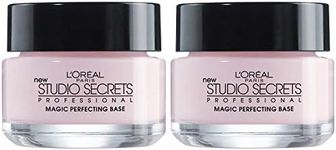Buying Guide for the Best Face Primer For Textured Skin
Choosing a face primer for textured skin can make a big difference in how your makeup looks and lasts throughout the day. Primers are designed to create a smooth base for foundation, helping to blur imperfections, minimize the appearance of pores, and even out skin texture. When shopping for a primer, it's important to consider your specific skin concerns, such as enlarged pores, rough patches, or uneven texture, and look for formulas that address those needs. Understanding the key features of primers will help you select the best one for your skin type and desired finish.Texture and FinishThe texture and finish of a primer refer to how it feels on your skin and the look it creates. Some primers are silicone-based and feel silky, helping to fill in uneven areas and blur pores, which is great for textured skin. Others are more lightweight and water-based, offering a natural finish without feeling heavy. If you want a matte look, choose a mattifying primer; for a dewy glow, opt for a hydrating or illuminating primer. Think about your skin’s needs—if you have rough or bumpy areas, a smoothing primer can help create a more even surface for makeup application.
Pore-Minimizing PropertiesPore-minimizing primers are formulated to reduce the appearance of large pores, which is a common concern for textured skin. These primers often contain ingredients that temporarily fill in pores and create a smoother look. If your main issue is visible pores, look for primers that specifically mention pore-blurring or pore-filling benefits. For mild texture, a light formula may be enough, but for more pronounced pores, a thicker, silicone-based primer can provide better coverage.
Hydration LevelHydration is important because dry or dehydrated skin can make texture more noticeable. Some primers contain moisturizing ingredients like hyaluronic acid or glycerin to help keep skin plump and smooth. If your skin tends to be dry or you notice flakiness, choose a hydrating primer. For oily or combination skin, a lightweight or oil-free primer can help control shine without emphasizing texture.
Longevity and GripA primer’s ability to help makeup last longer is called its grip or longevity. Some primers are designed to make foundation adhere better and stay put throughout the day, which is especially helpful if you have textured skin that can cause makeup to break up or settle unevenly. If you need your makeup to last for long hours or through heat and humidity, look for primers that mention long-wear or gripping properties.
Sensitivity and IngredientsIf you have sensitive or acne-prone skin, it’s important to check the ingredient list for potential irritants. Some primers are labeled as non-comedogenic, meaning they won’t clog pores, or fragrance-free, which can be gentler on sensitive skin. If you’re prone to breakouts or irritation, opt for a primer with simple, skin-friendly ingredients and avoid those with heavy fragrances or alcohol.
















